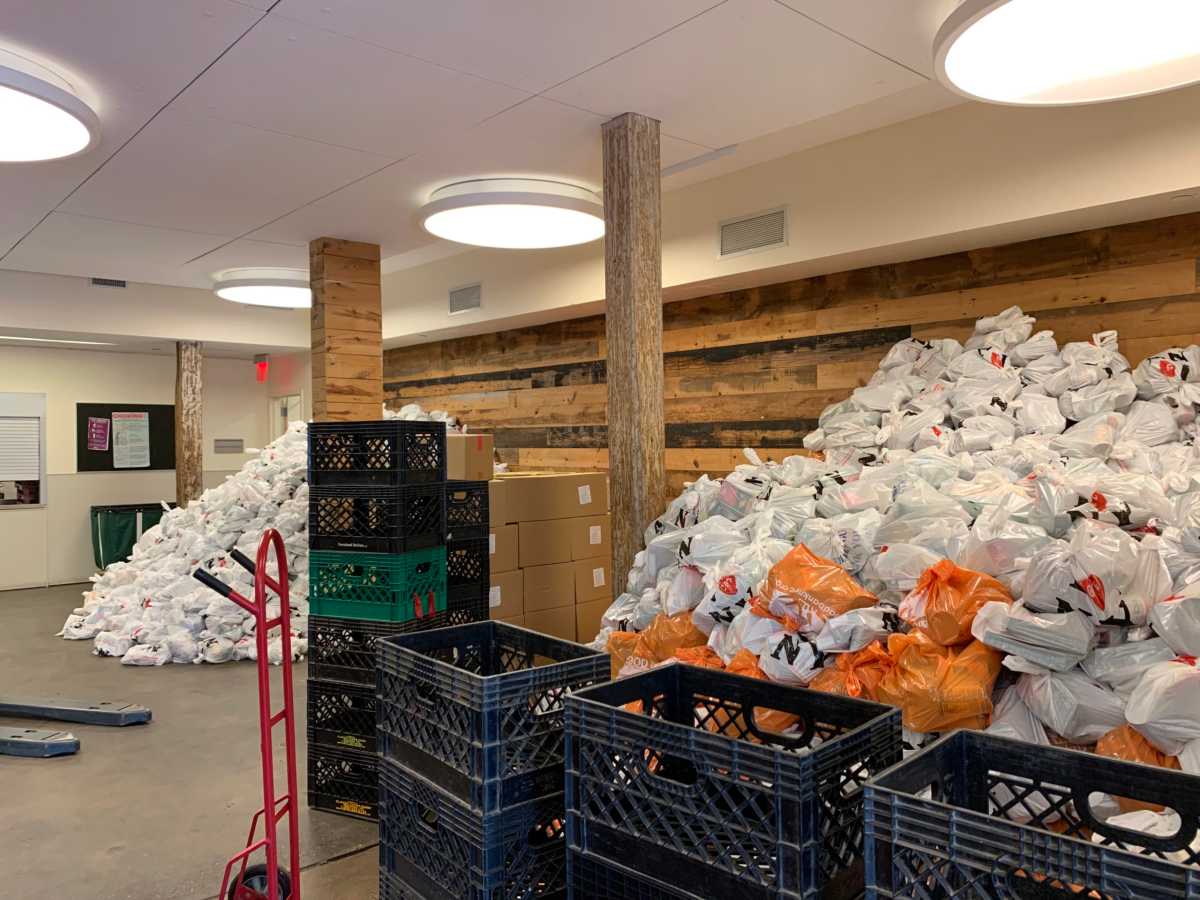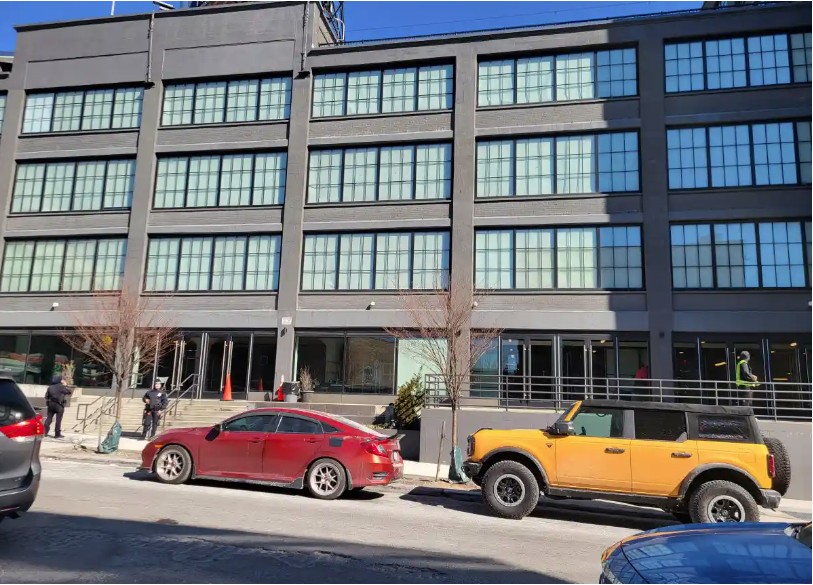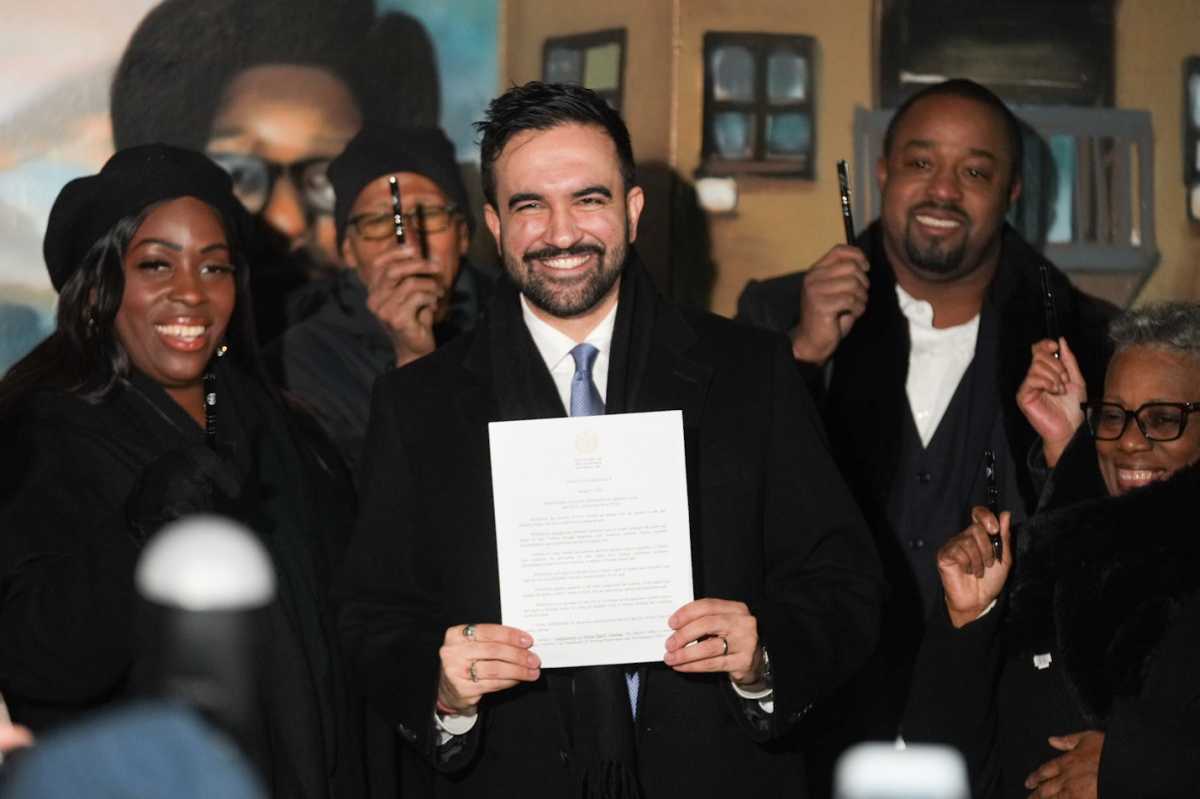Last Friday was a slower day than usual for food pantry pickup outside Part of the Solution, a nonprofit community center located in Fordham in the Bronx. Taina Rodriguez stood at the top of the steps at the entrance overlooking Webster Avenue where a few women waited on line evenly spaced out. Staff and volunteers at folding chairs and tables checked clients’ IDs against their file with POTS, as those who work and frequent the community center affectionately call it. Behind Rodriguez were crates of milk and eggs, bins filled to the brim with bags packed with a week’s worth of in-season produce and canned goods.
“If it was warmer, you’d see them lining up with the carts around the block,” said Rodriguez, the community center’s associate director of food and dignity programs. “You’ll see, they’ll trickle in.”
Seven of the ten candidates running in Tuesday’s special election for the City Council District 15 seat, vacated by Ritchie Torres when he was elected to Congress in November, have offered a range of solutions to address their district’s hunger and food crisis.
A year into the COVID-19 pandemic that has killed over 30,000 New Yorkers and left thousands unemployed and in need of assistance, POTS adapted its model quickly, filling in gaps the city overlooked. And because of its “one-stop-shop” model, the nonprofit has seen how New Yorkers have suffered this past year, and the ways officials have failed them, Rodriguez said. Their goal is to assist low-income individuals “from crisis to stability and self sufficiency,” according to Rodriguez, by providing aid across various levels of need, from showers, to food, to social services and case management.
Before the pandemic, POTS’ pantry and soup kitchen only serviced seven immediate zip codes around them in Fordham.
“But because of COVID, it didn’t matter where you came from – we have people coming from Queens and Brooklyn,” Rodriguez said. “We served over 2.3 million meals [in 2020], which is more than double what we did the year prior.”
Candidates Elisa Crespo, Ischia Bravo, Latchmi Gopal, John Sanchez, Troy Blackwell (who ultimately did not make the ballot but was spoken to for this story), and Kenny Agosto proposed educational programs about healthy food. Bravo, Crespo, Gopal and Sanchez are also advocating for the use of city land in the Bronx for urban farming as a way to improve the district’s access to locally grown fruits and vegetables. Jose Padilla Jr. said he wanted to expand fresh produce markets and allocate more money to food pantries in the district. Oswald Feliz emphasized expanding food stamps and growing youth internship programs as a way of combating hunger in the district.
PoliticsNY spoke to six of the eight candidates who mentioned food policy as part of their platform but reached out to all of the candidates except for Altagracia Soldevilla who could not be reached. Bravo and Bernadette Ferrara did not respond to requests for comment. Crespo had agreed to an interview but did not follow through.
When it comes to food, Rodriguez said, elected officials and those vying for their seats spend too much time trying to come up with “one-solution-fits-all” rather than listening to what members of the community are saying, and then don’t always follow through on campaign promises and proposals.
“I tell them ‘Here’s what I see. Here’s what people are asking for. Like, why are we not doing something?’” she said.
For the past year, she’s been adapting POTS in real time to meet the needs of people who’ve felt neglected. Some people who come to POTS for assistance have substance abuse problems, Rodriguez said. Beyond offering them a place to shower, and some food, housing and legal advice, there’s not much else POTS can do. Some of the responsibility should be taken up by local officials, she said.
“Everybody’s going to stand in front of us. They already know what the problems are, and they’re going to promise you 10,000 things on how they’re going to correct it,” she said referring to elected officials and the aspiring lawmakers. “The reality is they don’t stay in tune with the very people that gave [them] that information.”
Even with all the help they’ve received from donations, grants, and state funding, she said, POTS can only afford to provide a week’s worth of food per household once a month.
Rodriguez said she worries about her clients’ potential exposure to COVID-19 at supermarkets, but knows their pantry can only provide so much, especially when it comes to fresh produce. Their stock of fruit and vegetables depends on what’s in season and what they receive from food drives, local green markets, City Harvest, Food Bank for NYC and Catholic charities.
Most candidates acknowledge that one of the biggest issues facing District 15 is the lack of affordable, nutritious and healthy food.
“It’s not just the lack of accessibility to food, but it’s really the lack of accessibility and access to healthy foods,” Gopal said. “The key here is really investing in programming at community gardens, holding the Botanical Garden accountable for the ways in which they’re giving back to the community and expanding the healthy food option here.”
Padilla said one of his main concerns is expanding access to fresh produce in District 15 because a majority of its residents suffer from health problems like diabetes.
“We have access, [but] I think that we can do a lot more,” he said. “Anything that can be done to, you know, to try to get people to eat right. And hopefully, you know, do better in terms of health.”
He said he hoped the $1.9 trillion stimulus bill that was passed by Congress last week would expand SNAP benefits. And with the state’s vaccination eligibility expanding, he said, he hopes that it will lead to more people regaining their jobs and business reopening.
Sanchez is advocating for the expansion of the Food Retail Expansion to Support Health (FRESH) program, which offers zoning and tax incentives to encourage supermarkets to move to low-income neighborhoods and bring more affordable, fresh and healthy food options to residents living in areas with limited access to nutritious food.
Agosto and Feliz said they wanted to expand SNAP benefits to reach more families and improve fresh food options in local supermarkets. Sanchez and Blackwell also said they’d increase the amount of discretionary funds for food pantries in the district.
“It’s about making it easy for people, it’s more funding for food pantries in the district,” Blackwell said. “Those food pantries who, despite everything, going through this public health pandemic have stayed open. Many of them are severely, severely underfunded.”
Anthony Lipscomb, a client of POTS, said he thinks of the community center like family since they helped him find housing when he was living in a shelter with no support almost three years ago.
“I was going through a lot. I was really depressed. You know what I mean?” he said outside the community center where he’d just picked up his mail.
He’s no longer living in a shelter but still goes to POTS for the food pantry and to pick up his mail.
“They fed me when I was hungry, when I needed advice or a lawyer. They helped me out with everything,” he said.
Like many others who rely on POTS, he and his wife can only get food at POTS once a month. They receive about $400 monthly in food stamps, so they have to travel to other pantries in the Bronx, Brooklyn and Manhattan. And while POTS provides them milk, eggs and a lot of grains, rice, canned fruit and protein, they’re less likely to have a lot of fresh foods.
“The one in Brooklyn, they give you a lot of vegetables, and I like vegetables,” Lipscomb said.
He said he doesn’t mind going all the way to Bed-Stuy for fresh produce since he’s less likely to find any at food pantries in the Bronx.
Lipscomb said he hasn’t kept up with the special election because he’s trying to focus on his own life by staying healthy and paying the bills.
By now, most of the staff at POTS know him, he said. When he comes for his food pick up, the staff will hand him his mail and they’ll catch up with him about his week. He knows they have his back, he said.
But when it comes to elected officials or those running for their seats, he said he feels like they don’t take the time to listen to people like him and ask what he might need.
“You gotta talk to somebody and know what they’re going through in order to help them,” he said. “I still ain’t got everything I need, you know what I mean? But I’m working on it.”
Editor’s Note: A previous version of this story incorrectly listed two candidates who did not make it on the ballot and left off two candidates who did. PoliticsNY has since reached out to candidates Jose Padilla Jr. and Ariel Rivera-Diaz. Padilla’s response is included in the story. Rivera-Diaz has not yet responded.










